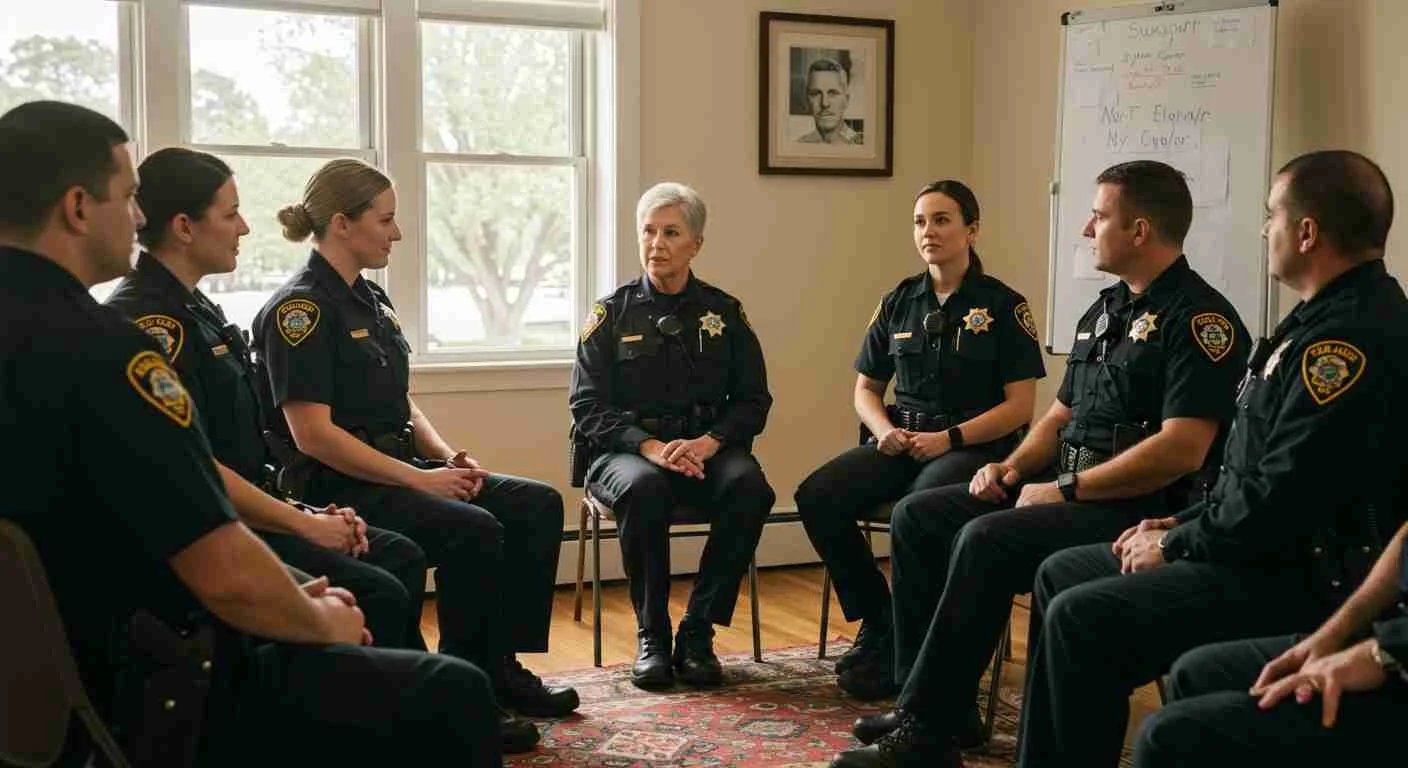Breaking Through: A Guide for Female First Responders in Recovery
The Call Box - Harbor of Grace National Law Enforcement & First Responders Wellness Center
You Are Not Alone in This Fight
As a female first responder, you've dedicated your life to protecting and serving others. You've faced dangers that most people never encounter, made split-second decisions under immense pressure, and carried the weight of your community's safety on your shoulders. But what happens when the person who needs protecting and serving is you?
If you're reading this, you've already taken the most courageous step—acknowledging that you need support. Whether you're struggling with substance use, mental health challenges, or both, know that seeking help isn't a sign of weakness. It's a sign of the same strength that got you through academy training, your first day on the job, and every difficult call since.
The Unique Challenges You Face
Navigating Male-Dominated Environments
Working in law enforcement, firefighting, EMS, or corrections often means being one of the few women in your department or unit. This reality creates unique pressures that your male colleagues may not fully understand:
The Constant Need to Prove Yourself: You may feel pressure to be twice as good to be considered half as competent. This pressure can lead to overwork, perfectionism, and reluctance to show any sign of struggle—including asking for help with mental health or substance use issues.
The "Boys' Club" Dynamic: Informal support networks that happen naturally among male colleagues might not be as readily available to you. This isolation can make it harder to recognize when you're struggling and even harder to reach out for support.
Different Standards, Same Expectations: You're expected to handle the same traumatic calls, dangerous situations, and high-stress environments as your male counterparts, but you may face additional scrutiny about your emotional responses or coping mechanisms.
The Hero Mentality Trap
First responder culture celebrates strength, resilience, and the ability to handle anything that comes your way. This "hero mentality" affects everyone in the field, but as a woman, you may face additional layers of complexity:
Fear of Professional Consequences: Admitting to substance use or mental health struggles can feel like career suicide, especially when you've already had to work harder to earn respect and advancement opportunities.
Imposter Syndrome: You might worry that seeking help will confirm others' doubts about whether you belong in this profession, particularly if you're in a leadership role or specialized unit.
The Superwoman Complex: Society often expects women to excel in their careers while maintaining perfect personal lives. When you're also a first responder, this pressure can become overwhelming.
Understanding Your Struggle
Common Mental Health Challenges
Female first responders face elevated risks for several mental health conditions:
Post-Traumatic Stress Disorder (PTSD): Repeated exposure to traumatic events can lead to symptoms like flashbacks, nightmares, hypervigilance, and emotional numbing. Women may experience PTSD differently than men, with higher rates of depression and anxiety occurring alongside trauma symptoms.
Depression and Anxiety: The combination of job stress, shift work, and traumatic exposure creates perfect conditions for mood disorders. Women are statistically more likely to experience depression and anxiety, and these conditions often go hand-in-hand with PTSD in first responders.
Compassion Fatigue: Constantly giving of yourself to help others in crisis can lead to emotional exhaustion and a decreased ability to empathize—ironically making it harder to care for yourself.
Substance Use Patterns
When mental health struggles go untreated, substance use often follows as a form of self-medication:
Alcohol: The most common substance used by first responders, alcohol might initially seem like it helps you unwind after difficult shifts or sleep better despite racing thoughts. However, it ultimately worsens anxiety, depression, and PTSD symptoms.
Prescription Medications: Access to pain medications through job injuries, combined with the stress of the job, can lead to prescription drug misuse. Sleep aids and anti-anxiety medications can also become problematic when used to cope with shift work and stress.
Other Substances: Some first responders turn to illegal drugs or misuse other substances to cope with emotional pain, stay alert during long shifts, or escape from traumatic memories.
The Intersection of Gender and Recovery
Unique Treatment Needs
Research shows that women often have different pathways into substance use and different recovery needs:
Trauma-Informed Care: Women are more likely to have histories of trauma before entering first responder careers, and job-related trauma can compound these earlier experiences. Effective treatment must address all layers of trauma.
Relationship and Family Considerations: Women often carry more responsibility for childcare and family management, which can complicate treatment scheduling and create additional stress during recovery.
Hormonal Factors: Menstrual cycles, pregnancy, and menopause can all affect mental health and substance use patterns in ways that need to be considered during treatment.
Breaking Down Barriers
Finding Your Voice: In male-dominated workplaces, you might have learned to minimize your needs or avoid appearing "difficult." Recovery requires learning to advocate for yourself and express your needs clearly.
Addressing Perfectionism: The pressure to be perfect at work often extends to recovery expectations. Learning that recovery is a process with ups and downs is crucial for long-term success.
Building New Support Networks: You may need to develop support systems outside of work, particularly if your workplace culture doesn't support mental health and recovery.
What Recovery Looks Like
Early Recovery Milestones
Physical Stabilization: If you're dealing with substance use, the first priority is safely managing withdrawal and achieving physical stability. This might require medical supervision and support.
Emotional Regulation: Learning healthy ways to manage the intense emotions that come with both your job and recovery. This includes developing coping strategies for stress, anger, sadness, and anxiety.
Sleep and Self-Care: Establishing routines that support your physical and mental health, including regular sleep schedules (challenging with shift work), nutrition, and exercise.
Building Long-Term Recovery
Trauma Processing: Working with qualified professionals to process both job-related and personal trauma in a safe, supportive environment.
Developing Healthy Coping Strategies: Replacing substance use or unhealthy behaviors with positive coping mechanisms like mindfulness, exercise, creative outlets, or spiritual practices.
Relationship Repair and Building: Addressing how your struggles may have affected relationships with family, friends, and colleagues, while building new, healthy connections that support your recovery.
Career Navigation: Learning how to maintain your career while prioritizing your mental health and recovery, which might include discussions about duty modifications, schedule changes, or career transitions.
Treatment Options and Approaches
Specialized Programs for First Responders
Residential Treatment: Intensive programs designed specifically for first responders offer immersive treatment experiences with peers who understand your unique challenges.
Outpatient Programs: Flexible treatment options that allow you to maintain work and family responsibilities while receiving care.
Peer Support Programs: Connecting with other first responders in recovery can provide invaluable understanding and support that civilian counselors might not be able to offer.
Evidence-Based Therapies
Cognitive Behavioral Therapy (CBT): Helps identify and change negative thought patterns and behaviors that contribute to mental health and substance use issues.
Eye Movement Desensitization and Reprocessing (EMDR): Particularly effective for processing traumatic memories and reducing PTSD symptoms.
Dialectical Behavior Therapy (DBT): Teaches skills for managing intense emotions, improving relationships, and tolerating distress without turning to substances.
Group Therapy: Provides opportunities to connect with others facing similar challenges and practice new skills in a supportive environment.
Your Rights and Protections
Legal Protections
Americans with Disabilities Act (ADA): Mental health conditions and substance use disorders can qualify as disabilities under the ADA, providing certain workplace protections and accommodation rights.
Family and Medical Leave Act (FMLA): You may be entitled to unpaid leave for treatment of serious health conditions, including mental health and substance use disorders.
State-Specific Protections: Many states have additional protections for first responders seeking mental health treatment. Research your state's specific laws and benefits.
Confidentiality Considerations
HIPAA Protections: Your medical and mental health treatment records are protected by federal privacy laws.
Employee Assistance Programs (EAP): Many departments offer confidential counseling services through EAPs, though it's important to understand the limits of confidentiality.
Fitness for Duty Evaluations: Understand your department's policies regarding when and how fitness for duty evaluations are conducted, and know your rights in these situations.
Practical Steps to Get Started
Immediate Actions You Can Take
Reach Out to Harbor of Grace: Contact our specialized programs designed specifically for first responders. Our staff understands the unique challenges you face and can help you navigate treatment options.
Talk to Your Doctor: Your primary care physician can be a valuable ally in addressing both physical and mental health concerns, and can provide referrals to specialists.
Contact Your EAP: If your department offers employee assistance programs, this can be a confidential first step to getting support and resources.
Connect with Peer Support: Look for first responder support groups in your area or online communities where you can connect with others who understand your experience.
Preparing for Treatment
Document Your Experience: Keep a journal of symptoms, triggers, and patterns. This information can be valuable for treatment providers.
Gather Support: Identify trusted friends, family members, or colleagues who can support you through treatment and recovery.
Plan for Work: Consider how you'll handle work responsibilities during treatment. This might involve talking to supervisors, using sick leave, or arranging for coverage.
Financial Planning: Understand your insurance benefits and explore financial assistance options if needed.
Supporting Your Recovery Journey
Building a Recovery-Focused Lifestyle
Stress Management: Develop a toolkit of healthy stress management techniques that work with your schedule and lifestyle.
Physical Wellness: Regular exercise, proper nutrition, and adequate sleep form the foundation of mental health and recovery.
Mindfulness and Meditation: These practices can be particularly helpful for managing PTSD symptoms and preventing relapse.
Creative Outlets: Art, music, writing, or other creative pursuits can provide healthy ways to process emotions and experiences.
Navigating Relationships
Family Education: Help your loved ones understand mental health and substance use disorders so they can provide appropriate support.
Workplace Relationships: Decide how much to share with colleagues and supervisors, and develop strategies for maintaining professional relationships while prioritizing your recovery.
New Connections: Build relationships with people who support your recovery and understand your commitment to wellness.
Long-Term Wellness Planning
Relapse Prevention: Develop a comprehensive plan for maintaining recovery, including identifying triggers, warning signs, and coping strategies.
Career Development: Consider how your recovery journey might influence your career path and what steps you want to take professionally.
Life Balance: Work on creating better balance between your demanding career and personal life, including setting boundaries and prioritizing self-care.
You Deserve Support and Recovery
Your career as a first responder has required incredible courage, dedication, and sacrifice. The same qualities that make you excellent at your job—your compassion, determination, and strength—will serve you well in recovery. But remember, you don't have to do this alone.
Seeking help isn't a betrayal of your commitment to service; it's an extension of it. By taking care of yourself, you're ensuring that you can continue to serve others effectively and safely. You're also setting an example for other women in your field who may be struggling silently.
Recovery is not a destination but a journey—one that requires the same persistence and courage you bring to your job every day. There will be challenges along the way, but with the right support, treatment, and commitment, you can build a life that includes both meaningful work and personal wellness.
Resources and Next Steps
Immediate Support
National Suicide Prevention Lifeline: 988
Crisis Text Line: Text HOME to 741741
SAMHSA National Helpline: 1-800-662-4357
First Responder-Specific Resources
Harbor of Grace National Law Enforcement & First Responders Wellness Center: [Contact information]
Badge of Life: Online resources and support for law enforcement officers
First Responder Trauma Counselors: Specialized therapy providers in your area
Treatment Locators
SAMHSA Treatment Locator: findtreatment.samhsa.gov
Psychology Today: Find therapists who specialize in first responder issues
Local medical providers: Start with your primary care physician for referrals
Remember, taking the first step toward recovery is often the hardest part. You've already shown incredible strength by reading this far. Now, take the next step. Reach out for help. You deserve to heal, to thrive, and to continue serving others from a place of wellness and strength.
Your badge doesn't define your worth, and your struggles don't diminish your service. You are valued, you are needed, and you deserve all the support and care that recovery can provide.
If you or someone you know is in immediate danger, please call 911 or go to your nearest emergency room. If you're having thoughts of suicide, call 988 for the Suicide & Crisis Lifeline.









